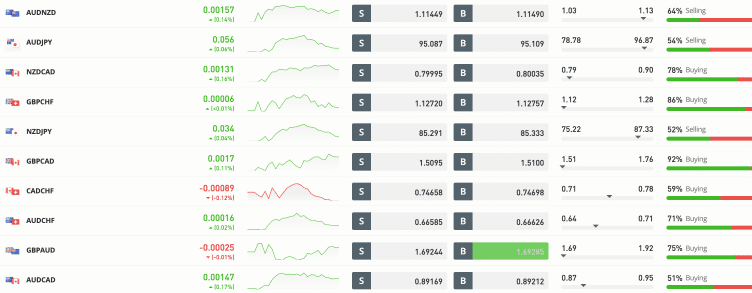Best Swap Free Brokers 2026
Pros and Cons
- No Interest Charges: Suitable for traders following Islamic principles, as they do not charge or receive interest.
- 24/5 Support: Provides round-the-clock assistance to help traders with their queries.
- Wide Range of Brokers: Multiple options available for swap-free trading, including industry leaders.
- Access to Diverse Markets: Allows trading in Forex, commodities, indices, and more without swap fees.
- No Hidden Fees: Transparent fee structures with no hidden swap costs.
- Limited Leverage: Some trading firms may offer lower leverage on interest-free accounts.
- Restricted Trading Conditions: Certain companies impose restrictions on trading strategies.
- Higher Spread or Commission: Some brokers might increase spreads or add commissions to compensate for the lack of swaps.
- Fewer Promotional Offers: Zero swap accounts may not be eligible for bonuses or promotions.
Introduction to swap-free brokers
Swap-free brokers have become an essential option for those looking to engage in financial markets without incurring interest charges on overnight positions.
Primarily designed to comply with Islamic finance principles, these accounts, also known as Islamic accounts, do not involve any form of Riba (interest), which is forbidden in Islam.
However, these accounts are not limited to Islamic traders; they also attract those seeking to simplify trading costs and avoid hidden fees.
As the demand for ethical and interest-free trading grows, understanding the intricacies of swap-free brokers is becoming increasingly important for all types of clients.
What is swap-free trading?
Swap-free trading refers to trading on an account where no interest or rollover fees are charged for holding positions overnight.
Typically, in Forex and CFD trading, brokers charge a fee called a swap, which is essentially the difference in interest rates between the currencies being traded.
This fee is either credited or debited depending on whether the trader is buying or selling a currency with a higher or lower interest rate.
This type of trading eliminates these fees, allowing investors to maintain open positions without worrying about the added costs of keeping trades overnight.
This is particularly advantageous for those who hold positions for extended periods, such as swing traders and position traders, and those who wish to avoid the complexities associated with calculating and accounting for daily interest charges.
Benefits of choosing swap-free brokers
There are several compelling reasons to consider a no-swap broker, including:
- Adherence to religious principles: For Islamic traders, rollover-free accounts are a must to comply with Sharia law, which prohibits earning or paying interest. These accounts provide an ethical way to participate in trading while respecting religious beliefs.
- Simplified cost structure: Swap-free accounts remove the hidden costs associated with overnight interest fees, making it easier for people to understand their actual trading expenses and calculate potential profits and losses.
- Flexibility in holding positions: Investors can maintain positions over long periods without worrying about the cumulative cost of swap fees, which can significantly impact profitability.
- Transparent trading environment: Interest-free provides greater transparency, as users are not exposed to unexpected charges or hidden fees related to swaps.
Understanding the mechanics of swap-free accounts
How do non-swap accounts work?
These accounts eliminate the overnight interest fees that brokers typically charge.
However, to maintain profitability, brokerage firms may employ other mechanisms to replace the lost revenue from swaps.
Some common practices include:
1. Higher spreads: Brokers may widen the spreads on interest-free accounts to offset the absence of interest fees.
2. Fixed fees: Some companies introduce a fixed fee, often labeled as an “administration fee” or “service fee,” to compensate for the lack of swap charges.
3. Limited access to certain instruments: In some cases, brokers might restrict the availability of specific trading instruments on rollover-free accounts or impose different conditions for their use.

Types of swap-free accounts
These can be broadly categorized into several types, catering to different kinds of users:
1. Standard interest-free accounts: Designed for individuals, these accounts offer the same trading conditions as regular accounts but exclude swap fees.
2. Professional non-swap accounts: Tailored for more experienced traders, these accounts may offer lower spreads, higher leverage, and advanced trading tools, all within a swap-free framework.
3. Institutional accounts: Aimed at institutions or high-net-worth individuals, these accounts provide bespoke services, such as dedicated account managers, customized trading conditions, and priority support, without charging swaps.
Key features of the best swap-free brokers
The best zero swap brokers offer several essential features that set them apart:
- No swap charges: The primary feature of interest-free brokers is that they do not charge overnight interest on open positions.
- Transparent fee structures: Leading brokers provide clear and upfront information about any fees or charges that might replace swaps, such as higher spreads or administrative fees.
- Regulation and safety: The best zero swap brokers are regulated by reputable authorities such as the FCA (UK), CySEC (Cyprus), or ASIC (Australia), ensuring the safety of client funds and adherence to high operational standards.
- Diverse asset selection: Top brokers offer access to a wide range of financial instruments, including Forex, commodities, indices, and cryptocurrencies, providing more opportunities for diversification.
- Advanced trading platforms: Effective trading requires robust platforms like MetaTrader 4 (MT4), MetaTrader 5 (MT5), or cTrader, which provide essential tools for analysis, risk management, and execution.
- Strong customer support: Excellent client service is a hallmark of top brokers, providing multilingual support and multiple channels for communication, including live chat, phone, and email.
Popular swap-free brokers and their offerings
Several brokers are recognized for their offerings.
Below is a closer look at some of the most popular choices:
1. IC Markets: Known for its ultra-low spreads, fast execution, and diverse range of assets, IC Markets offers non-swap accounts for Muslims. It is regulated by ASIC and CySEC and provides access to advanced trading platforms like MetaTrader and cTrader, ensuring a robust trading experience.
2. Exness: Exness offers flexible swap-free accounts with competitive spreads and a user-friendly interface. The company is regulated by the FCA and CySEC, providing a secure trading environment. Exness also supports a wide range of payment methods, making it convenient for traders worldwide.
3. XM: XM provides interest-free accounts with no interest charges on overnight positions. Known for its fast execution, tight spreads, and extensive asset selection, XM is a preferred choice for many. The broker also offers a comprehensive suite of educational resources, which is particularly beneficial for beginners.
4. FBS: FBS caters to both retail and professionals with its non-swap accounts, providing multiple account types, including cent, micro, standard, zero spread, and ECN options. Regulated by IFSC and CySEC, FBS offers competitive trading conditions and a range of tools and resources for all levels of users.
5. Tickmill: A firm known for its low trading costs and no-requote policy, Tickmill offers non-swap accounts to comply with Sharia law. Tickmill is regulated by the FCA and CySEC, ensuring a high level of security.
| Broker | Regulation | Key Features |
| IC Markets | ASIC, CySEC | Low spreads, Advanced platforms |
| Exness | FCA, CySEC | User-friendly, Flexible account types |
| XM | FSC, CySEC | Wide asset range, Strong educational resources |
| FBS | IFSC, CySEC | Multiple account types, Swap-free options |
| Tickmill | FCA, CySEC | Low-cost trading, No requotes |
Factors to consider when choosing a broker
Selecting the right non-swap broker involves evaluating several factors to ensure that the broker meets your specific trading needs:
- Regulation and security: Choosing a regulated company is crucial for ensuring the safety of your funds and maintaining trust in the trading process. Brokers regulated by authorities like the FCA, CySEC, or ASIC adhere to stringent standards and offer more protection.
- Fee structure: Understanding the fee structure of a non-swap broker is vital. Some firms may charge higher spreads or additional administrative fees to compensate for the absence of swap charges. Carefully review all fees and ensure they align with your trading strategy.
- Platform features: A reliable trading platform with advanced charting tools, multiple order types, and fast execution is essential for a successful trading experience. Look for brokers that offer platforms like MetaTrader 4, MetaTrader 5, or cTrader.
- Variety of assets: Ensure that it provides access to a wide range of trading instruments, including Forex, commodities, indices, and cryptocurrencies. A diverse selection allows for better portfolio management and risk diversification.
- Customer support quality: Prompt and knowledgeable customer support is crucial, especially when dealing with account-related issues or technical difficulties. Search for companies that offer multilingual support and multiple communication channels.
- Account types and conditions: Evaluate the different account types offered by the broker and consider whether they align with your trading style and requirements. Some offer more flexible account conditions, which can be beneficial for swap-free traders.
How to open a swap-free account
Opening a non-swap account is generally a straightforward process, but it may vary slightly depending on the broker:
1. Select a broker: Start by choosing a firm that offers non-swap accounts and meets your trading needs. Consider factors such as regulation, platform features, fees, and customer support.
2. Register on the website: Complete the registration process by providing personal information and selecting the non-swap account option.
3. Verify your identity: Most companies require you to verify your identity by submitting documents such as a government-issued ID, proof of residence, or proof of religious affiliation.
4. Fund your account: Deposit funds using the broker’s available payment methods. Make sure to choose a broker that offers secure and convenient funding options.
5. Begin trading: Once your account is set up and funded, you can start trading without worrying about overnight interest charges.
Comparing popular brokers: A detailed analysis
To help investors make an informed decision, let’s take a closer look at some of the most popular swap-free brokers, their offerings, and how they compare:
IC Markets vs. Exness
- Regulation and Security: Both IC Markets and Exness are highly regulated. IC Markets is regulated by ASIC and CySEC, while Exness is regulated by the FCA and CySEC. Both brokers offer a high level of security and adhere to strict financial standards.
- Fees and Spreads: IC Markets is known for its ultra-low spreads, starting from 0.0 pips on its Raw Spread account. Exness also offers competitive spreads, but may charge slightly higher spreads on swap-free accounts to compensate for the absence of swaps.
- Platform Features: Both firms provide access to advanced trading platforms, including MetaTrader 4, MetaTrader 5, and cTrader. IC Markets offers additional features like automated trading tools and VPS hosting, while Exness provides a user-friendly interface and fast execution speeds.
- Asset Variety: IC Markets offers a broader range of assets, including over 60 currency pairs, commodities, indices, cryptocurrencies, and more. Exness also provides a diverse selection of trading instruments, but may have slightly fewer options in some categories.
- Customer Support: Both brokers offer excellent support, with 24/5 availability, multilingual assistance, and multiple communication channels.
XM vs. FBS
- Regulation and Security: XM is regulated by several authorities, including CySEC, ASIC, and the FSC, while FBS is regulated by IFSC and CySEC. Both companies are considered reliable and secure.
- Fees and Spreads: XM offers tight spreads starting from 0.6 pips and does not charge any additional fees on its rollover-free accounts. FBS also provides competitive spreads, but traders may encounter wider spreads or fixed fees on specific non-swap accounts.
- Platform Features: Both brokers offer MetaTrader 4 and MetaTrader 5 platforms, with XM also providing additional educational resources and market analysis tools. FBS offers a proprietary mobile app for trading on the go.
- Asset Variety: XM offers a wide range of assets, including Forex, commodities, indices, stocks, and cryptocurrencies. FBS also provides a diverse selection of instruments, but may have fewer options in some categories.
- Customer Support: XM is known for its strong customer support, with 24/5 availability, multilingual assistance, and dedicated account managers. FBS also offers reliable support with 24/7 availability in several languages.
| Broker | Regulation | Spreads | Platforms | Asset Variety |
| IC Markets | ASIC, CySEC | Ultra-low (from 0.0 pips) | MT4, MT5, cTrader | Extensive |
| Exness | FCA, CySEC | Competitive | MT4, MT5, cTrader | Diverse |
| XM | CySEC, ASIC, FSC | Tight (from 0.6 pips) | MT4, MT5 | Wide range |
| FBS | IFSC, CySEC | Competitive | MT4, MT5, FBS Trader | Varied |
Common challenges and limitations of swap-free trading
While trading offers many advantages, traders should be aware of some potential challenges and limitations:
- Higher spreads or commissions: Some brokers may offset the absence of swap fees by charging higher spreads or additional commissions. These costs can add up over time and impact overall profitability.
- Restricted access to specific instruments: Swap-free accounts may have limited access to certain instruments or impose different conditions for using them. For example, some companies may restrict scalping or high-frequency trading strategies.
- Verification requirements: To qualify for an account, users may need to provide documentation or proof of their religious beliefs, which can be cumbersome and time-consuming.
- Incompatibility with automated strategies: Automated trading strategies that rely on holding positions overnight may not be compatible with some rollover-free, especially if the broker imposes restrictions or additional costs.
How to choose the best broker for your needs
Choosing the best broker involves assessing several key factors to determine the right fit for your trading style and preferences:
1. Understand your trading style: Consider whether you are a long-term trader, swing trader, or short-term trader. Your trading style will influence your choice of broker and account type.
2. Evaluate regulation and security: Ensure the broker is regulated by reputable financial authorities, providing a secure environment for your funds.
3. Compare fees and spreads: Look at the fee structure, including spreads, commissions, and any administrative charges. Choose a firm that offers competitive fees in line with your trading strategy.
4. Assess platform features: Consider the features and tools available on the trading platform, such as charting capabilities, order types, and speed of execution.
5. Check asset variety: Look for a firm that offers a wide range of trading instruments, allowing for greater flexibility and diversification.
6. Test customer support: Ensure the company provides reliable support, with multiple communication channels and prompt response times.
7. Review account types and conditions: Choose a broker that offers flexible account conditions, including swap-free options tailored to your needs.
Examples of successful trading strategies
Several trading strategies can be effectively implemented on swap-free accounts.
Here are some popular examples:
- Long-term trend following: This strategy involves identifying and following long-term trends in the market. Interest-free accounts are ideal for this strategy, as traders can hold positions for extended periods without incurring overnight fees.
- Swing trading: Swing trading aims to capture short- to medium-term price movements, typically over days or weeks. Rollover-free allows investors to hold positions overnight without worrying about swap costs.
- Hedging: Hedging involves opening multiple positions to offset potential losses. Swap-free accounts can be beneficial for hedging strategies, as they reduce the costs associated with holding multiple positions overnight.
- Carry trade without swaps: In a traditional carry trade, traders profit from the interest rate difference between two currencies. With interest-free accounts, market participants can focus on price movements rather than interest rate differentials, making this strategy less dependent on swap fees.
Regulatory landscape and its impact on zero swap brokers
The regulatory landscape plays a significant role in shaping the services and conditions offered.
Different regulatory authorities have specific rules and standards that brokers must adhere to, which can impact swap-free trading in several ways:
1. Ensuring transparency: Regulated firms must provide clear and accurate information about their services, fees, and trading conditions, ensuring that potential investors understand the true cost of trading.
2. Protecting users’ funds: Regulated companies are required to segregate funds from their operational funds, providing additional protection in the event of financial difficulties.
3. Maintaining ethical standards: Regulatory bodies enforce strict rules to ensure fair trading practices, protecting clients from unethical behavior or malpractice.
4. Limiting leverage: Some regulatory authorities impose limits on leverage, affecting the trading conditions available on interest-free accounts. Customers must be aware of these limitations when choosing a broker.
| Regulatory Body | Impact on Swap-Free Brokers |
| FCA (UK) | Ensures transparency and fair trading practices, limits leverage. |
| CySEC (Cyprus) | Protects user funds, enforces ethical standards. |
| ASIC (Australia) | Requires segregation of funds, maintains regulatory oversight. |
The future of swap-free trading
The future of swap-free trading looks promising as more brokers recognize the need to cater to a diverse clientele, including Muslims and others seeking interest-free trading options.
Key trends shaping the future of trading include:
1. Expansion of offerings: More brokers are expected to introduce swap-free accounts to meet growing demand, especially in regions with significant Muslim populations.
2. Technological innovation: Advancements in trading technology, such as AI and algorithmic trading, will likely impact swap-free trading by enabling more sophisticated strategies and tools.
3. Greater customization: Brokers may develop more tailored swap-free account options to meet specific trader needs, providing greater flexibility and choice.
Comparison of top swap-free brokers
This table provides a comparison of key features of some leading interest-free brokers in the market.
| Broker | Regulation | Account Types | Spreads | Commission | Execution Speed | Customer Support | Deposit Methods |
| IC Markets | ASIC, CySEC | Standard, Raw Spread, Swap-Free | From 0.0 pips | $3.5 per lot | Ultra-fast (0.1 sec) | 24/7 | Credit Card, Bank Transfer, PayPal |
| Exness | FCA, CySEC | Standard, Pro, Zero, Swap-Free | From 0.3 pips | No commission on Standard accounts | Fast (0.2 sec) | 24/7 | Credit Card, Bank Transfer, Skrill, Neteller |
| XM | CySEC, ASIC, FSC | Micro, Standard, XM Ultra Low, Swap-Free | From 0.6 pips | No commission | Fast (0.2 sec) | 24/5 | Credit Card, Bank Transfer, Skrill, Neteller |
| FBS | IFSC, CySEC | Cent, Micro, Standard, Zero Spread, ECN, Swap-Free | From 1.0 pips | $6 per lot on ECN accounts | Fast (0.3 sec) | 24/7 | Credit Card, Bank Transfer, Skrill, Neteller, Perfect Money |
| Tickmill | FCA, CySEC | Classic, Pro, VIP, Swap-Free | From 0.0 pips | $2 per lot on Pro accounts | Ultra-fast (0.1 sec) | 24/5 | Credit Card, Bank Transfer, Skrill, Neteller |
| Pepperstone | ASIC, FCA, DFSA | Standard, Razor, Swap-Free | From 0.0 pips | $3.5 per lot | Ultra-fast (0.1 sec) | 24/5 | Credit Card, Bank Transfer, PayPal |
| FXTM | FCA, CySEC, FSCA | Micro, Advantage, Advantage Plus, Swap-Free | From 0.1 pips | From $4 per lot | Fast (0.3 sec) | 24/5 | Credit Card, Bank Transfer, Skrill, Neteller |
| OctaFX | CySEC | Micro, Pro, ECN, Swap-Free | From 0.2 pips | No commission on most accounts | Fast (0.3 sec) | 24/5 | Credit Card, Bank Transfer, Skrill, Neteller |
| RoboForex | IFSC | Prime, ECN, R Trader, Swap-Free | From 0.0 pips | $2 per lot on ECN accounts | Fast (0.2 sec) | 24/7 | Credit Card, Bank Transfer, Skrill, Neteller, WebMoney |
| eToro | CySEC, FCA, ASIC | Retail, Professional, Swap-Free | From 1.0 pips | No commission | Moderate (0.5 sec) | 24/5 | Credit Card, Bank Transfer, PayPal |
| XTB | FCA, CySEC | Standard, Pro, Swap-Free | From 0.3 pips | No commission on Standard accounts | Fast (0.2 sec) | 24/5 | Credit Card, Bank Transfer, PayPal, Skrill |
| FXOpen | ASIC, FCA | Micro, Standard, ECN, Swap-Free | From 0.0 pips | $3.5 per lot | Ultra-fast (0.1 sec) | 24/5 | Credit Card, Bank Transfer, Skrill, Neteller |
| LiteFinance | CySEC | Classic, ECN, Swap-Free | From 0.1 pips | $2.5 per lot | Fast (0.2 sec) | 24/5 | Credit Card, Bank Transfer, Skrill, Neteller |
| Vantage | ASIC, FCA | Standard STP, Raw ECN, Pro ECN, Swap-Free | From 0.0 pips | $3 per lot | Ultra-fast (0.1 sec) | 24/5 | Credit Card, Bank Transfer, PayPal |
| EasyMarkets | ASIC, CySEC | Standard, VIP, Swap-Free | From 0.7 pips | No commission | Moderate (0.5 sec) | 24/5 | Credit Card, Bank Transfer, Skrill, Neteller |
| InstaForex | CySEC | Micro, Standard, ECN, Swap-Free | From 0.8 pips | No commission on most accounts | Fast (0.3 sec) | 24/7 | Credit Card, Bank Transfer, Skrill, Neteller |
| Deriv | FSC, VFSC | Standard, Advanced, Swap-Free | From 0.5 pips | No commission | Fast (0.3 sec) | 24/7 | Credit Card, Bank Transfer, Skrill, Neteller |
| Naga | CySEC | Standard, Pro, VIP, Swap-Free | From 0.3 pips | No commission on Standard accounts | Fast (0.2 sec) | 24/5 | Credit Card, Bank Transfer, Skrill, Neteller |
| HYCM | FCA, CySEC, CIMA | Fixed, Classic, Raw, Swap-Free | From 0.2 pips | $4 per lot | Fast (0.2 sec) | 24/5 | Credit Card, Bank Transfer, Skrill, Neteller |
| FXTM | FCA, CySEC, FSCA | Micro, Advantage, Advantage Plus, Swap-Free | From 0.1 pips | From $4 per lot | Fast (0.3 sec) | 24/5 | Credit Card, Bank Transfer, Skrill, Neteller |
Conclusion
Swap-free brokers provide an essential service for traders looking to avoid interest charges, whether for religious, ethical, or practical reasons.
By offering a transparent and flexible trading environment, swap-free trading platforms cater to a wide range of clients, from novices to seasoned professionals.
As the demand for interest-free trading options continues to grow, interest-free brokers are expected to play an increasingly important role in the global financial markets.
Choosing the right swap-free broker requires careful consideration of factors such as regulation, fees, platform features, and customer support.
Traders should take the time to research and compare different firms to find the one that best meets their needs.
With the right company, investors can enjoy a rewarding trading experience free from the complexities and costs associated with swaps, allowing them to focus on making informed and profitable trading decisions.
Frequently Asked Questions
What is a swap-free broker?
A swap-free broker provides trading accounts that do not incur overnight interest charges, often suited for Islamic traders.
Why choose a swap-free broker?
They are ideal for those adhering to Islamic finance laws, which prohibit earning or paying interest.
Do all companies offer swap-free accounts?
No, not all brokers offer rollover-free accounts; it is typically provided by brokers catering to Islamic clients.
Are there additional fees for swap-free accounts?
Some firms may charge additional fees, like wider spreads or commissions, to compensate for the lack of swaps.
Can I use a swap-free account for all types of trading?
While swap-free accounts can be used for various trading types, some brokers impose restrictions on certain trading strategies.
What are the best ones?
The best swap-free brokers vary depending on factors like fees, regulations, and trading conditions; examples include AvaTrade, XM, and FXTM.
How do I open a swap-free account?
You can open a swap-free account by applying through a broker that offers this type of account and verifying your eligibility.
User Reviews
Resources
- What Is a Swap-Free Trading Account, and How Does it Work?
- What is a swap-free trading account?
- What is a swap fee in Forex
- About swaps: Exness Help Center
- What Is Swap Free and How to Enable it on a Trading Account
Article written, edited and reviewed by
Disclaimer:The information provided on this site should not be distributed or used by any individual in any country or jurisdiction where such distribution would violate local laws or regulations.
Last updated: February 26, 2026




